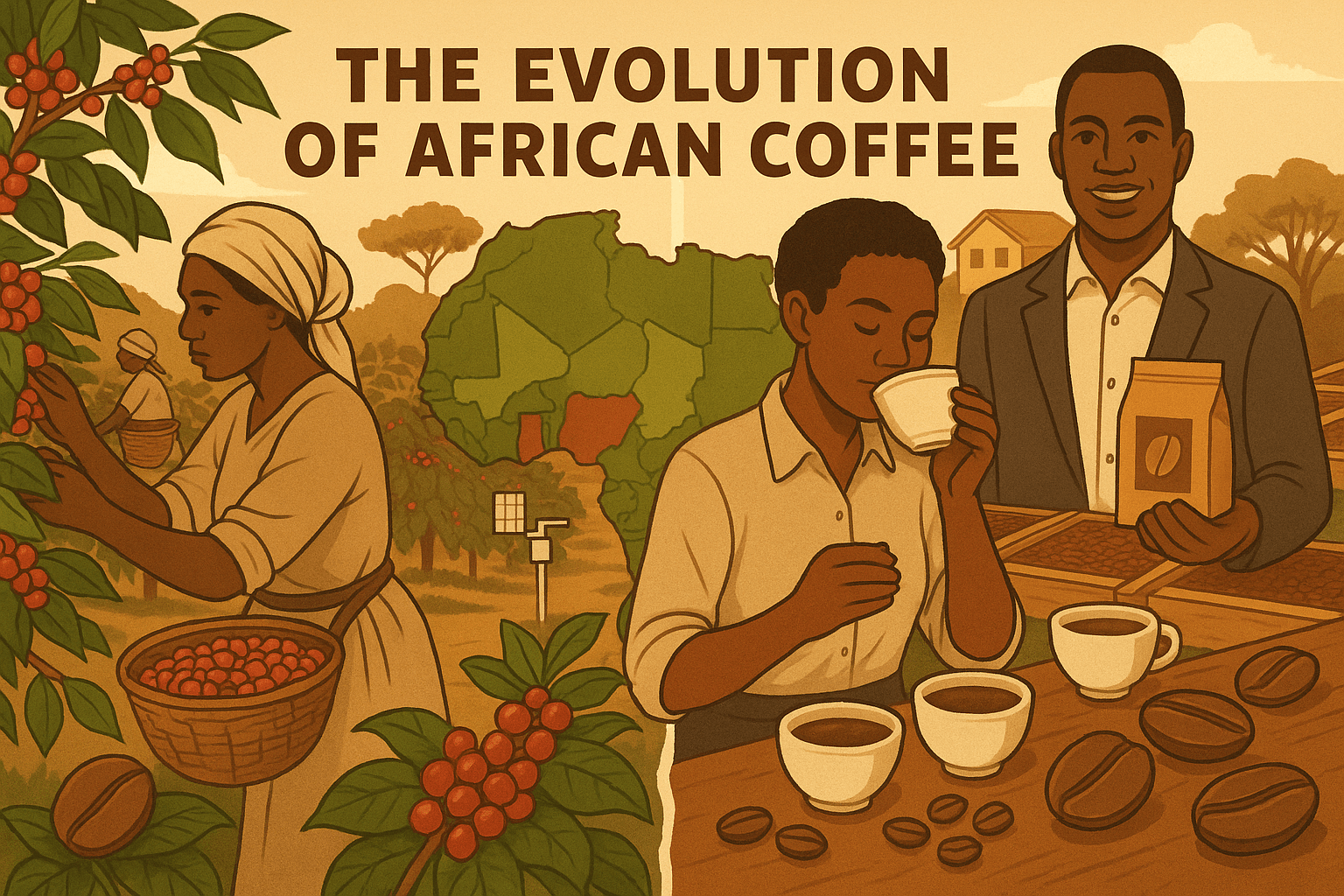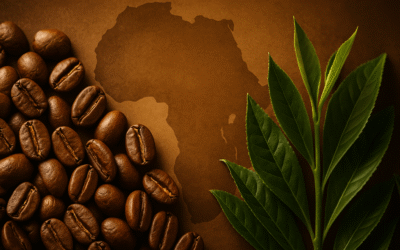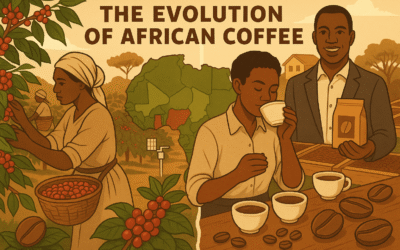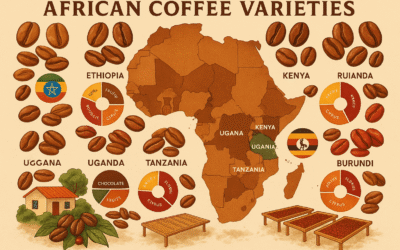Africa’s journey in coffee production has transformed from forced colonial cultivation to becoming a global quality leader, revolutionizing the industry through sustainability and specialty markets.
Introduction: Africa’s Coffee Renaissance
Africa stands at the dawn of a new era in coffee production. Once imposed as a colonial crop, African coffee has evolved into a symbol of economic empowerment and cultural pride across the continent. This transformation isn’t merely about volume—it’s about value, innovation, and reclaiming Africa’s rightful place in the global coffee narrative.
From the volcanic soils of Ethiopia—coffee’s ancestral home—to the high-altitude farms of Rwanda and Kenya, African producers are rewriting the story of coffee, transitioning from commodity suppliers to stewards of some of the world’s most distinctive and sought-after beans.
As the Africa Coffee & Tea Expo 2025 prepares to showcase this renaissance in Kigali this July, let’s explore how African coffee evolved from a colonial export to a global powerhouse driving sustainable development across the continent.
The Colonial Legacy: Coffee’s Forced Introduction
From Indigenous Discovery to Colonial Exploitation
While coffee originated in Ethiopia, where it was discovered and consumed for centuries, its widespread cultivation across Africa came through colonial powers seeking to exploit the continent’s favorable growing conditions.
Featured Snippet: Coffee’s Colonial Timeline in Africa
- 1700s: Coffee cultivation spreads from Ethiopia to other regions
- Mid-1800s: European powers establish large coffee plantations
- Early 1900s: Forced labor systems implement widespread cultivation
- 1950s-60s: Independence movements begin reclaiming coffee production
- 1990s-present: Rise of African specialty coffee and producer empowerment
In countries like Kenya, Uganda, and Tanzania, colonial authorities compelled local farmers to grow coffee exclusively for export to European markets. This extractive model prioritized quantity over quality, with minimal benefits flowing back to producing communities.
Post-Independence Challenges
Following independence, many African nations inherited coffee sectors built on colonial infrastructure but faced new challenges:
- Volatile global commodity prices
- Declining soil quality from intensive farming
- Political instability affecting production
- Limited access to global markets
- Lack of processing technology
Despite these obstacles, countries like Ethiopia maintained their coffee heritage, while nations like Rwanda recognized coffee’s potential for economic transformation.
The Quality Revolution: Rise of African Specialty Coffee
From Commodity to Specialty
The late 1990s marked a turning point for African coffee as the specialty market emerged. Consumers began seeking unique flavor profiles and sustainable sourcing—areas where African producers excelled.
This shift created opportunities for African coffees to command premium prices based on their distinctive characteristics:
- Ethiopian coffees: Floral, fruity notes with wine-like acidity
- Kenyan coffees: Bold, bright profiles with blackcurrant notes
- Rwandan coffees: Complex sweetness with orange blossom hints
According to the International Coffee Organization, specialty African coffees now regularly command 30-100% price premiums over commodity coffee, creating substantial value for producing communities.
Producer Empowerment Through Direct Trade
Concurrent with quality improvements came changes in how African coffee reached markets. Direct trade relationships—where roasters work directly with producers—have become increasingly common, especially in Rwanda, Burundi, and Ethiopia.
Organizations like TechnoServe have facilitated these connections while providing technical assistance to improve quality and yield.
Sustainability and Innovation: African Coffee’s Future Path
Climate Adaptation Leadership
African producers are increasingly at the forefront of climate-smart coffee production. As research from FAO indicates, climate change threatens to reduce suitable coffee-growing areas by up to 50% by 2050.
In response, countries like Ethiopia and Rwanda are pioneering:
- Shade-grown coffee systems preserving forest canopies
- Water conservation techniques
- Drought-resistant varietals
- Organic farming methods reducing chemical inputs
These innovations aren’t just preserving coffee—they’re creating models for sustainable agriculture globally.
Value Addition and Processing Innovation
Perhaps the most significant evolution is Africa’s move toward greater value addition. Rather than exporting raw green beans, more countries are investing in:
- Local processing facilities
- Specialty coffee washing stations
- Domestic roasting operations
- Coffee tourism experiences
Rwanda’s National Agricultural Export Development Board (NAEB) has been instrumental in supporting these initiatives, helping transform the country into a specialty coffee powerhouse despite its relatively small production volume.
The African Coffee Renaissance: ACT Expo 2025
The upcoming Africa Coffee & Tea Expo 2025 in Kigali represents a milestone in this journey. The event will bring together over 150 exhibitors and 5,000 participants to showcase Africa’s coffee innovation while addressing critical challenges including:
- Climate change adaptation
- Market access expansion
- EU deforestation regulations
- Supply chain resilience
- Women and youth inclusion
With prominent speakers like Dr. Agnes Kalibata (former Rwandan Minister of Agriculture) and industry pioneers like Margaret Nyamumbo (founder of Kahawa 1893), the event highlights how far African coffee has come from its colonial past.
Conclusion: From Extraction to Empowerment
African coffee’s evolution from colonial crop to global powerhouse represents more than an economic shift—it’s a reclamation of heritage and identity. As consumers worldwide increasingly value transparency, sustainability, and unique flavor experiences, African producers are positioned to lead coffee’s next chapter.
For stakeholders throughout the value chain—from farmers to roasters to consumers—engaging with African coffee today means participating in this transformative journey. Whether by attending events like the ACT Expo 2025, seeking out African specialty beans, or supporting initiatives that empower producers, each cup represents an opportunity to advance coffee’s most promising frontier.
Are you involved in the African coffee sector or planning to attend the Africa Coffee & Tea Expo 2025? Share your experiences or questions in the comments below, or contact us to feature your story.





